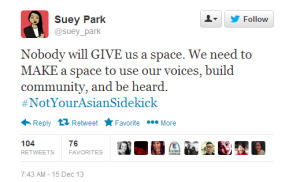Nobody will GIVE us a space. We need to MAKE a space to use our voices, build community, and be heard. #NotYourAsianSidekick
— Suey Park (@suey_park) December 15, 2013
Despite being a tech-capable, twenty-something, I have resisted jumping on the Twitter bandwagon. But conversations like the one that began this past weekend (and is still continuing) using the hashtag #NotYourAsianSidekick seriously make me reconsider. Started by freelance writer Suey Park (@suey_park), it was created to spark a global discussion about Asian American feminism. Folks chimed in to talk about patriarchy in Asian American communities, the lack of race and class discussions in mainstream white feminism, Asian American stereotypes, queer perspectives, the silencing of mental health issues within Asian American communities, etc. etc.
If you’re short on time and don’t want to scroll through all 50,000+ tweets, media sites have been blowing up with recaps, pulling out their favorites and offering their perspectives on the conversation behind the hashtag. And as Suey Park wrote yesterday morning, “This is a movement, not a trend” and an important one to continue.
There’s a lot to relate to in the few hundred tweets I’ve managed to peruse since learning about the conversation. I should say first that I self-identify as both Asian American and as a feminist. And as a non-Twitter user, I’ll resort to sharing snapshots of my experiences and thoughts here in more than 170 characters. In no particular order:
 1. Yellow Fever is not a joke. It’s a real thing that crosses my mind anytime I learn a prospective partner has a history of dating Asian Americans. And it should be said that those labeled as “having yellow fever” are not to be universally condemned either. And maybe in a few rare occasions, the topic can be artfully joked about. Emphasis on rare and few.
1. Yellow Fever is not a joke. It’s a real thing that crosses my mind anytime I learn a prospective partner has a history of dating Asian Americans. And it should be said that those labeled as “having yellow fever” are not to be universally condemned either. And maybe in a few rare occasions, the topic can be artfully joked about. Emphasis on rare and few.
2. If I was bi or queer, would my Chinese grandmother accept me? If my brother was bi or queer, would she accept him?
3. When I was in high school, I was a science dork. So on the one hand, I was obviously [sarcasm] “good at it” because I was Asian but on the other hand, one of few women interested in the topic. When I was eight or ten and I went to Lego Camp (yes, internet, that happened), I was embarrassed for fitting into too many Asian stereotypes. I was closer to being, but not quite, proud to be a girl interested in engineering, but I knew, even at that age, that it was a male-dominated field.
4. If I should ever have a daughter, I want her to learn about the “exotic Oriental” stereotype so she can understand the history, but I don’t want her to ever experience it or be a victim to it.
5. I like to think that the feminist groups I’ve been part of were inclusive to all people of color, but I know that’s not true. I was not the token Asian or token minority, but despite our best efforts, individuals felt the groups did not represent their voices sufficiently. There’s a need for solidarity as urgently as there is a need for respect and discussion of unique experiences.
6. I have often been the one to bring Asian American-ness/POC to conversations about gender and vice versa. I wait for the day when the two intersect more fluidly – for when the onus of bringing up the intersection and explaining why a group of people (who are not necessarily all Asian American women) should care is not just ours. I dream for the day I don’t feel the need to bring it up, it is simply part and parcel of our evolving dialogue over these big issues.
So what does an Asian American feminist community look like? Share your thoughts, comments, and questions related to building this movement!








